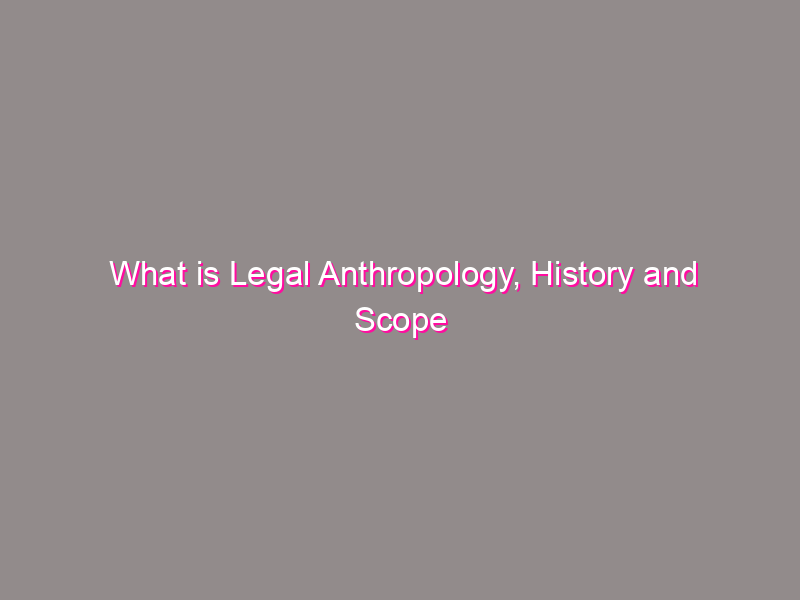

Legal anthropology is a nascent science. It examines the characteristics of legal forms of human activity in different historical epochs and in very different contexts. For researchers, developments in this area are very important because they help them recognize the diversity of world law and see law in the perception of representatives of different countries and cultures.
As a new scientific study, in-depth research is needed to understand the main subjects that can be studied in the study of legal anthropology. Therefore, so that Grameds friends are not confused about understanding it, in this discussion we will discuss the study of legal anthropology which you can study at home.
Definition of Legal Anthropology
Legal anthropology explores the ways in which laws are created, including the social contexts in which they are created, the ways in which laws maintain and change other social institutions, and the ways in which laws structure social behavior. social meaning and legal meaning.
However, as the post-Cold War era and the political world order developed, the scope of legal anthropology research expanded to explore the relationship between social conflict and economic inequality, and the limits of law on the performance of social engineering. .
Legal anthropology now also examines the relationship between politics and law as it changes in the post-Cold War context. As a result of this broadening of scope, some have even referred to 19th-century legal anthropological studies as proto-forensic anthropological studies.
The definition of anthropology is the science of humans. According to Hilman Hadikusuma, anthropology is a science that studies humans from a biological and cultural perspective. The main aim of anthropology is humans, then cultural behavior.
Anthropology views law as an aspect of culture, namely by ordinary social authorities to regulate behavior and society in such a way that there are no deviations from established social norms and deviations are corrected, I see it as an aspect that is used.
Legal anthropology as a science has been influenced by anthropology and legal science, so that as a ‘child’ it has a ‘father’ anthropology and a ‘mother’ legal science, therefore understanding anthropology and legal science is a prerequisite for studying forensic anthropology to understand. Legal anthropology as a science empirically studies human behavior and all its aspects in relation to written and unwritten legal norms.
The material study of anthropological legal problems through the management and coordination of various spheres of public life, their correlation with proven practice, allows researchers to build a clear structure of the legal system, understand its internal factors and discover mechanisms of development and symbiosis. social group. In the current situation, the interest in this type of scientific research is very large, especially in researching the sources of law represented by customs and customs.
Legal anthropology is a special field of cultural anthropology that specifically observes people’s behavior according to legal rules. Relevant legal rules are not limited to normative law, but also include customary law and the culture of community behavior.
Even though it is a development of cultural anthropology, legal anthropology is not ethnocentric, meaning it is not limited to a particular culture. The aim of the research is to examine the relationship between legal and cultural aspects and social organization.
From an anthropological point of view, law is an integral part of culture as a whole and therefore law is studied as a product of social interactions influenced by other aspects of culture such as politics, economics, ideology, religion, etc.
Definition of Legal Anthropology According to Experts
1. Hoebel
An acceptable definition of forensic anthropology is Hoebel’s formulation that social norms are laws. Violators will be subject to physical sanctions, social sanctions and other sanctions by those authorized to act if an act or violation of social norms occurs.
2. Leopold Pospisil
In contrast, Leopold Pospisil argued: Compare and study human societies. Apart from a society that is already cultured and not qualitatively differentiated, we need to consider how easy the stages of development of society are, including:
-
- Legal anthropology does not consider a balanced society that collapses when deviations occur, but rather sees society as dynamic so that the role of society and law is not limited to maintaining the status quo. As Stone argues, legal anthropology does not believe in legislative incompetence.
- Legal anthropology includes empirically based jurisprudence, according to which the theory presented must support relevant facts, or at least present relevant facts.
- The definition of anthropology is the science of humanity. According to Hilman Hadikusumah, anthropology is a science that studies humans both from a biological and cultural perspective. The main subject of anthropology is humans, then cultural behavior.
- Anthropology sees law only as part of culture, that is, as an aspect used by orderly social forces to regulate behavior and society in such a way that no deviations and deviations from prescribed social norms can be corrected when they arise.
- Legal anthropology is a branch of legal science that studies patterns of disputes and their resolution in both simple and modern societies. This restriction was introduced by Paul Bohannan..
3. Hillman Hadikusuma
The definition of anthropology is the science of humans. According to Hilman Hadikusuma, anthropology is a science that studies humans from a biological and cultural perspective. The main aim of anthropology is humans, then cultural behavior.
Anthropology considers law as an aspect of culture, namely that which is used by ordinary social authorities to regulate behavior and society in such a way that there is no deviation from established social norms and deviations are corrected. .
4. William Nixon
According to William Nixon (1998), legal anthropology is a field of research that tries to explain the order in society. Law is seen as an important part of culture.
In legal anthropology, law is considered part of culture because it is formed, determined, and enforced to meet the needs of members of society.
History of Legal Anthropology
There are seven important periods in the development of legal anthropology. The first period occurred in the 1860s when Sir Henry Maine, based in India, published ancient laws summarizing various legal traditions and theorizing that every developing society would undergo a change from its primitive version to a Victorian society.
Maine’s views could certainly be characterized as racist in a modern context because they glorify European civilization.
Another period occurred in the 1920s, when Bronislaw Malinowski criticized Maine’s theory and developed an ethnographic approach to the study of law. Adamson Hoebel co-published The Cheyenne Way with legal scholar Karl Llewellyn in 1941, which used a case study approach to study foreign law. Hoebel’s approach was a return to Maine development theory.
In the mid-20th century, anthropologists debated the use of Anglo-American legal classification systems in studying non-Western societies. The two protagonists of this discussion are Max Gluckman and Paul Bohannan.
Bohannan believed that Anglo-American legal categorization limited the understanding and representation of other cultures and favored the use of local expressions when concepts could not be translated into English but could be explained. At the same time, Gluckman considers Bohannan’s approach to be too cautious and actually hinders comparative analysis.
In the 1970s, legal anthropological research experienced a transition from rule of law to legal process. The idea of studying legal processes is related to legal pluralism, alternative systems and legal structures that exist in every society.
In the 1980s, postmodern debates and criticism emerged that challenged the traditional classifications of legal anthropologists. The case approach developed by Hoebel was intended to ignore legal compliance in society and emphasize Anglo-American legal values.
In the 1990s, legal anthropology studies continued to develop because many researchers wanted studies from various perspectives, such as: linguistic approaches, narrative approaches, interdisciplinary studies, transnational perspectives and the relationship between law and social culture.
The Anthropological Structure of Law
The structure of legal anthropology includes the following sections of this discipline:
-
- Theoretical information about countries and laws. It is necessary to address epistemological and methodological aspects to be able to apply the results in practice.
- Legal ontology, which is a field of knowledge about human existence related to state law, is the rights, freedoms, privileges and obligations that play an important role in the formation of the legal culture of society.
- Ethnographic anthropology as part of jurisprudence. The general purpose of this data field is to describe changes in human behavior and actions due to the development of legal norms, traditional and ancient societal customs, legal relationships and mutual conflicts, as well as comparative analysis of outdated norms. and modern systems take human perception into account.
Functions and Objectives of Legal Anthropology
Scientific research in this area is the result of a deep distinction between current law and theoretical aspects of law. In this sense, anthropology is a discipline on two levels:
-
- the first stage is a logical-philosophical block of knowledge about law and the state;
- The second stage is a practical applied complex, the development of which is absolutely necessary for the direct application of the knowledge gained in legal activities.